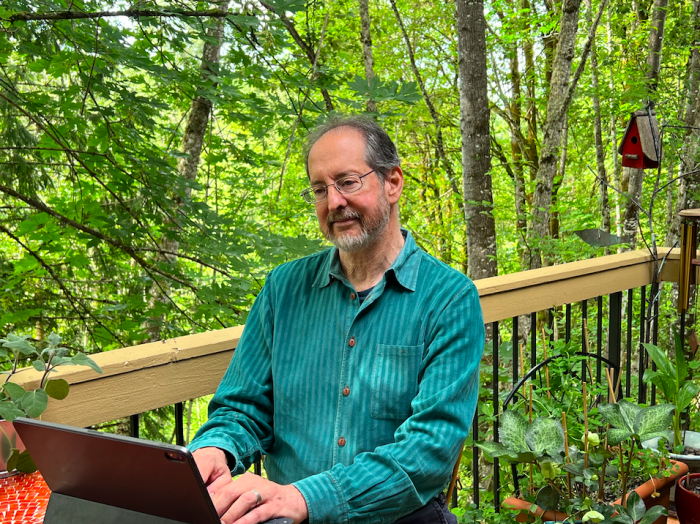Last week, I noticed something in my Elephant Journal profile that I hadn’t noticed before.
There was a comments tab that, with the tap of my finger, offered a link to all the journal articles I’ve commented on.
I hadn’t realized that in the two years I’ve been subscribing to this journal and submitting articles to the editorial team, I’ve left 75 comments on writers’ work. It struck me that leaving comments was probably just as important for me as reading articles and writing my own.
But why did commenting matter so much to me?
This article is a response to my musings about the personal meaning of commenting. I write not only to develop my own thoughts but to invite other readers to share their commenting practices and values (perhaps in a comment?). And, by speaking about the importance of comments for me, I hope some readers who tend not to comment may be encouraged to give comments a try.
Here are my six top reasons for commenting.
1. Commenting completes the writing-reading circle.
To me, writers and readers have always seemed to be in a kind of communication circle. Writers convey experiences, feelings, and ideas to readers, readers construct meaning from the writers’ work, and then, ideally, readers share their responses with writers to complete the writing-reading encounter. Writers and readers are in a mutual relationship, even if it’s only an implied one.
Commenting on another’s essay enables me to play my part in the writer-reader relationship.
And doing so does not feel like a duty or obligation or a way of getting the writer to leave comments on my work. Commenting feels intrinsically satisfying, the way being in any healthy relationship feels.
2. Commenting helps me savor a theme.
When I compose a comment about an especially moving, beautiful, or provocative aspect of a written piece, I’m able to stay with and linger over the specialness of the writing. Instead of just gulping down a writer’s post, I can let my response brew. This is a way of savoring the writer’s offering.
For example, early in my experience with Elephant Journal, I came across a wonderful article about the meaning and value of writing, “How Writing Turns the Imperfect & Mundane into Magic,” by Beth October.
I loved this piece and wrote a fairly detailed comment to the author to convey my enthusiastic reaction and the reasons for it. Toward the end of the comment, I spoke about how beautiful and effective I found one metaphoric line in particular. (The line read: “A page is an empty room simply waiting for your favorite chair, your chipped coffee cup, a memory that you forgot to love.”)
3. Commenting is a way to make a difference.
When a comment of mine lands with a writer, and they let me know, I feel like I’ve made a difference, however small, in another’s life. I’m grateful and pleased when I hear from a writer that any of my words resonated with them. For example, one writer wrote that my comment was “like a warm hug” and “made her smile.”
Many of my comments are intended to share with a writer my interpretation and application of a theme they conveyed. What I hope with this kind of comment is that the writer sees that their words have been a catalyst for me to deepen or expand my perspective on a theme and possibly act in a new or different way. Some writers suggest that they feel affirmed when learning in a comment that a reader has not only received their message but is applying it in their life.
For example, after reading an insightful article on daily practices to enhance writing (“6 Daily Practices to Level Up Your Writing Game” by Dhana Musil), I commented on how the practice of “tracking our emotions while we write” struck me as especially useful and something I wanted to try out myself. The writer commented back to express her appreciation and say a bit more on the subject.
4. Commenting enables me to know better what I think.
When I take the time to comment on an article, I am taking the time to develop my thoughts about it. Often, I read an article quickly, get the gist of it, and move on with my day without much thought. Opening time to comment is a way of opening space for the meaning of a piece to grow.
For example, I recently read a piece by an author I follow, Juliana Otis, who happens to be an Elephant Journal editor and has graciously edited quite a few of my own essays. Juliana was writing about being in a “conditional relationship,” which was an intriguing way of characterizing what she also described as a very healthy relationship (“I’m in a Conditional Relationship—& Here’s why it’s the Healthiest one I’ve ever Been In.“)
When I first read the article, I said to myself, “Oh, I see what she is getting at, and this makes good sense.” But when I later decided to comment, I realized my response, if I let it incubate, went further. Juliana’s piece piqued my curiosity about this theme and prompted me to reflect on my own relationship experiences. In formulating a comment, I was bringing into fruition a fuller understanding of Juliana’s theme and its meaning in my own life.
5. Commenting helps me make connections.
When I hold space for commenting, what arises for me at times is a connection with a book, another article, a poem, or a song that has held special meaning for me. Building a bridge between a writer’s work and another writer or artist’s offerings is a way of extending my thoughts further about an author’s ideas and savoring my discoveries as a reader.
For example, when developing a comment on another of Juliana’s essays (“On Letting Go of the Shadow Side of Substance Use—& Finally Letting in the Light.”), the Bruce Springsteen song, “Land of Hope and Dreams,” came to me. In part, this song was about choosing the best and leaving the rest. I found the song in my playlist, listened to it anew, and shared a couple of lines with Juliana, who made a positive reference to the lyrics in a return comment to me.
6. Commenting helps me to be authentic about self-doubt in my writing process.
Revealing self-doubt in my writing process is a new practice for me. It emerged in response to comments made by two readers of my last article, on ways of using pranayama to free the breath. One commenter was my brother, Randy, who has long been a supportive reader. Randy pointed to a metaphor he was especially drawn to about the breath as a missile. In a comment, I disclosed that I almost didn’t use this image, for fear that it might be viewed as over-the-top—too dramatic and exaggerated.
Why did I feel the need to share the doubt I harbored about the missile metaphor? I’m not entirely sure, but I think it was a way of being honest with myself and readers about the self-questioning and self-challenging that goes on for me every time I put pen to paper.
Being transparent about writing as a kind of up and down and back and forth process, and not just a finished product, seems important to me when writing personal essays. To connect personally with readers, it’s helpful for me, at least occasionally, to share uncertainties and identify difficult choice points along the writing path.
If my experience is any guide, commenting can be a way to enrich a reader’s experience of a writer’s work, to further a connection with a writer, and to build a vibrant reading-writing community.
Any and all of your comments are welcome!
Please consider Boosting our authors’ articles in their first week to help them win Elephant’s Ecosystem so they can get paid and write more.









Read 10 comments and reply